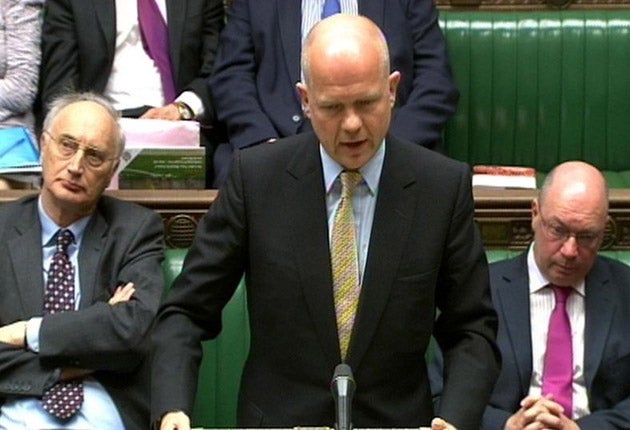William Hague backs Syria reforms

It is "not too late" for Syrian president Bashar Assad to abandon brutal repression of his people, Foreign Secretary William Hague insisted today.
Mr Hague said it was still possible that the British-educated leader could follow through on democratic and civil liberty reforms he has promised.
But he also cautioned that Assad may not be "free" to pursue such changes, even if he wanted to.
The comments came as a statement condemning violence in the Middle East state was being negotiated at the United Nations in New York.
Interviewed on BBC Radio 4's Today programme, Mr Hague repeated his view that Syria was at a "fork in the road".
"President Assad has made two major speeches on reform in Syria," he said.
"It is not too late for him to say he is really going to do these reforms, and additional reforms."
Mr Hague went on: "It is not too late for him to do these things, to say that the death that has occurred will be investigated.
"There is a major diplomatic effort going on to persuade the Syrian authorities to go down that prong of the fork, the right way."
Mr Hague said he believed President Assad was "interested" in making changes and he could "imagine him as a reformer".
"The difficulty, one of the difficulties, in Syria is that President Assad's power depends on a wide group of people in his own family and, of course, other members of his own government," the Foreign Secretary said.
"I am not sure how free he is to pursue a reform, even if he wanted to do so."
Mr Hague denied that the UK's language on Syria had been "gentle" compared to its hardline approach to Libya. He said he condemned "utterly" the way peaceful protests had been put down.
Defence Secretary Liam Fox played down the prospect of a Libya-style military intervention in Syria last night after holding talks in the US with counterpart Robert Gates.
He urged the regime in Damascus to "pause and reflect" about the consequences of its actions amid widespread criticism and the threat of sanctions.
More gunfire has been reported in the city of Daraa, where the uprising began.
Thousands of soldiers backed by tanks were said to have poured into the area yesterday.
Other crackdowns and arrest sweeps were reported on the outskirts of Damascus and the coastal town of Jableh.
Human rights groups estimate that around 350 people have died since the start of the unrest in March and Syrian human rights groups say 500 pro-democracy sympathisers have been detained.
Contingency plans have been drawn up to evacuate around 700 British nationals - who have been advised to leave the country unless they have a pressing need to stay - if the situation worsens, Mr Hague told MPs yesterday.
UN secretary general Ban-Ki Moon has called for an "independent and transparent" investigation into the violence.
After briefing the Security Council behind closed doors, he condemned the "continuing violence against peaceful demonstrators, most particularly the use of tanks and live fire that have killed and injured hundreds of people".
Mr Ban said Syrian authorities have an obligation to protect civilians and respect human rights, and he remained convinced that "only an inclusive dialogue and genuine reform can address the legitimate aspirations of the Syrian people and restore peace and social order".
The council postponed a discussion of a draft media statement - circulated by France, Britain, Germany and Portugal - until this afternoon because some members did not have instructions from their capitals.
It is thought that Lebanon, the only Arab member of the council, and Russia are likely to oppose a council statement.
Mr Hague said that the Syrian ambassador, Sami Khiyami, had been summoned to the Foreign Office to make clear Britain's condemnation of the "unacceptable use of force" against protesters, and particularly the deployment of the Syrian army.
The Permanent Under Secretary, Simon Fraser, told Dr Khiyami that the Syrian government should immediately halt all attacks against protesters and restrain the army and security forces.
"He made clear that perpetrators of violence against civilians would be held to account and that it was vital that the government of Syria responded to the legitimate demands of the Syrian people with reform and not repression," Mr Hague said in a statement.
"Syria was now at a fork in the road: if violence stopped immediately there was still an opportunity to follow the path of reform."
Dr Khiyami was called in yesterday in coordination with similar action by other European capitals designed to reinforce international concern about the regime's actions.
Asked by MPs whether he believed non-military pressure could succeed in persuading the Syrian regime to halt its repression, Dr Fox said: "I would hope there is at least a flicker of hope there."
The world had rightly condemned the "appalling spectacle of a despotic regime bearing down on its people", he told the Defence Select Committee.
Subscribe to Independent Premium to bookmark this article
Want to bookmark your favourite articles and stories to read or reference later? Start your Independent Premium subscription today.

Join our commenting forum
Join thought-provoking conversations, follow other Independent readers and see their replies